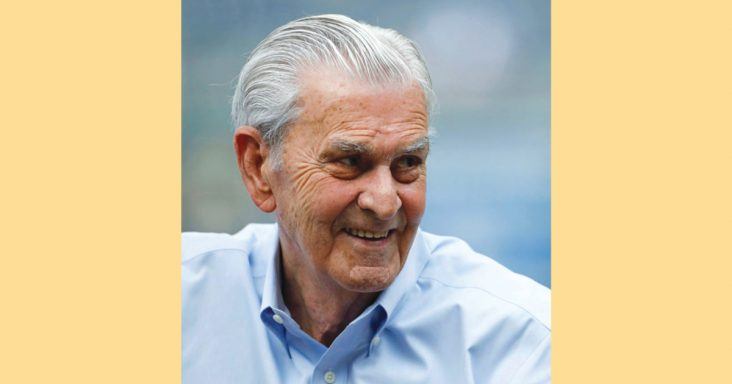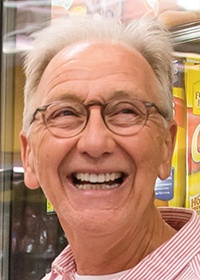David Glass’ leadership path did not include shortcuts
by February 4, 2020 12:52 pm 1,921 views

David Glass, Walmart’s CFO (1976-1984), president and COO (1984-1988) and CEO (1988-2000), died Jan. 9 of complications associated with pneumonia. He was 84.
Andy Wilson, a retired Walmart executive, remembers former CEO David Glass as the smartest person in the room, but who never forced his way of thinking on others.
“He listened to your ideas, and he encouraged you,” Wilson said. “He let you fail and learn from your failures. Mr. Glass was a person of humility. He inspired you to see the opportunities with open eyes, and he served others from a state of confidence. He led with a humbled heart.”
Glass, Walmart’s CFO (1976-1984), president and COO (1984-1988) and CEO (1988-2000), died Jan. 9 of complications associated with pneumonia. He was 84.
As the retailer’s chief executive, Glass played a pivotal role in a period of extraordinary growth for the company. Annual revenues increased from $15 billion to roughly $165 billion. Walmart’s international investments and new retail concepts like the Supercenter and Neighborhood Market also happened while Glass was CEO. Tracing the timeline, Walmart became the world’s largest retailer in 1990, the largest private employer in 1999 and the largest corporation by total sales in 2001, surpassing ExxonMobil.
Glass was also instrumental in the development and success of Walmart’s automated distribution network, which served as a competitive advantage for many years while the rest of retail played catch-up. To recognize his contributions of linking Walmart and its suppliers via computer technology, Walmart’s massive technology division in Bentonville is housed in the David Glass Technology Center.
Glass was honored with numerous retail and business awards over the years, including being named “most admired CEO” in 1993 by Fortune Magazine, and inducted into the Retail Hall of Fame in 2000 and the Arkansas Business Hall of Fame in 2003.
He served as a member of the Walmart board of directors until 2011.
“David’s knowledge of the grocery industry, his financial acumen and his embrace of technology were invaluable as we rapidly grew the business,” Rob Walton, Sam and Helen Walton’s son and a former board chairman, said in a statement. “When we lost Sam [in 1992], David provided a steady, visionary hand the company needed to lead it forward. He did so with a deep sense of humility while maintaining the values and principles Dad founded the company on.
“More than anyone beyond Sam Walton, David Glass is responsible for making Walmart the company it is today.”
FOLLOW THE FOOD
Glass’ strategy to lead the retailer into the food business continues to play an essential role in the company 30 years later. According to the company’s latest quarterly earnings report in November, grocery sales account for 56% of Walmart’s total U.S. revenue, making it the country’s largest grocer.
In a recent interview following Glass’ death, Wilson recalled a management meeting in Bentonville in 1987 when Wilson was a regional vice president. Glass was leading a discussion on the impact food would have on the company’s future. When it was over, Wilson asked Glass if he would travel back to Louisiana with him to tour a few stores.

“I wanted to know more about the food business,” Wilson recalled. Wilson held store, regional and divisional operations positions with the retailer, culminating as vice president of people division (HR) for all domestic store operations with more than 900,000 associates and management staff. He retired in 2001 and lives in Northwest Arkansas. “We landed in New Orleans on a Tuesday. After we toured the Walmart stores, Mr. Glass said, ‘For lunch, we’re going to tour Schwegmann’s.’”
Wilson said the two men grabbed hot dogs for their lunch and set about their store walk of Schwegmann’s, a supermarket chain pioneer in New Orleans that closed 20 years ago. Glass’ knowledge of the grocery industry was immediately evident.
“About five minutes into the tour, I threw my hot dog in the trash, grabbed my notepad and went to school,” Wilson said. “His knowledge about products and categories and what drove the food business was decades ahead. He said water would become the biggest category, overtaking soft drinks. He talked about organic products and the importance of healthy, prepared foods. I had to research what organic was.
“Our trip was two days, but it was a lifetime of learning for me.”
A native of Mountain View, Mo., Glass served in the U.S. Army from 1954 to 1956 after graduating high school. After leaving the Army, Glass earned a business degree from Southwest Missouri State University, now named Missouri State University, in Springfield.
Upon graduation, Glass began his retail career in 1960 with Crank Drug Co. in Springfield. He left Crank in 1968 after the company was sold, and he worked for two other companies, including serving as general manager of Consumer Markets, a grocery store chain in Springfield.
Like Glass, Wilson also joined Walmart in 1976. He said Glass made a lasting impact on his life and is grateful and humbled to have worked for him.
“Growing up without a father, I was always drawn to men that had a strong character, decision-making and leadership skills,” Wilson said. “The two men who had the most significant impact on my life were Mr. Sam [Walton] and Mr. Glass. Mr. Glass held himself to the highest standard of character, and when it came to leadership, he did not take shortcuts.
“As Mr. Sam said to me one day dove hunting in the sands of South Texas, ‘That David is a good one.’”
PASSION FOR BASEBALL
Following his retirement from Walmart, Glass spent 20 years as owner and chief executive officer of the Kansas City Royals.
In 1993, Glass was appointed interim chairman and CEO upon the passing of Ewing Kauffman, the original owner of the franchise since its inception in 1969. In April 2000, the Glass family paid $96 million to buy the Royals organization. Despite mostly lean years under Glass’ ownership, the Royals made consecutive appearances in the World Series in 2014 and 2015. Kansas City won the world championship in 2015, a first for the franchise in 30 years.
Glass was also elected to the board of directors of the National Baseball Hall of Fame in July 2000, where he served as a member of the Pension and Audit Committees.
This past summer, the Glass family agreed to sell the franchise to local Kansas City businessman John Sherman and a group of investors. The deal was widely reported to be in the neighborhood of $1 billion.
“Like so many Kansas Citians, I am deeply saddened by the news of David’s passing,” Sherman said in a statement. “His voice among other owners was so respected. He led several Major League Baseball committees to better the game. His passion for baseball and love for Kansas City was the driving force in bringing success on the field for this franchise.”
Northwest Arkansas Business Journal reporter Kim Souza contributed to this story.
